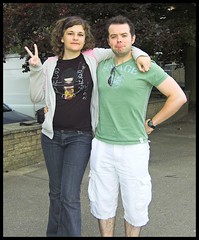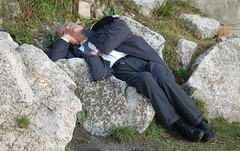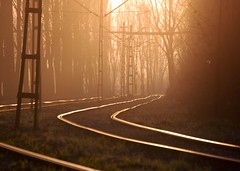My literature project has been in full swing for ten years now. It
started when I took a year out between school and university, and I
was brow-beaten by a co-worker who looked down at me for watching so
much television. That year was one of the best years of my life for
reading - I covered a great many of the classics, like Moby
Dick, and a lot of H.G. Wells. It marked the beginning, and over on librarything I'm keeping track of everything I've read since that year. What came before, I've hurriedly buried in the depths of my memory. Sure, I read before I was eighteen, but what did I read? Star Trek and Star Wars novels mostly. They weren't a waste of time - Peter David (Star Trek) and Timothy Zahn (Star Wars) are two excellent writers, and I thank them for helping me stick with reading in the first place. But as much as I read, my father would never say that I was 'well-read,' and with the added motivation of showing my co-worker I was no dullard, I set about my task.
Ten years later, I'm about to finish reading book number 300. This
happens to be "The House of Mirth" by Edith Wharton, which I am very much enjoying. But as much as I'm enjoying reading new books, I think it's high time I revisited some of those that charmed me, perplexed me, or informed me over the last ten years.
I spent a very enjoyable hour earlier this afternoon working through my librarything catalogue, adding the tag 'to_reread' to those books which fell into one of those categories, and came up with a list of 55 that I want to return to with the benefit of age. 55 is a lot of books, mind you, and I wouldn't be surprised if it takes me two or more years to work through all of them - keeping in mind, of course, that I will often be tempted by the new, by the unread, and will want to add to my tally and work towards my lifetime target (currently the rather random 2000).
Here they are, then: the books I'll be reading between now and when I turn 30, more or less, along with reasons for wanting to read them again.
Personal Favourites
One of the most wonderful friendships I currently enjoy began thanks to Somerset Maugham's "The Moon and Sixpence," and the conversations we had together after this introduction. Now I want to read again those books that had the greatest impression on me personally, and that I hold closest to my heart and my sensibilities. It's one thing to say, for instance, that "The Razor's Edge" is my favourite book - but it's quite a shameful thing to admit to having read it only once.
- 1984 (George Orwell)
- Animal Farm (George Orwell)
- The Beach (Alex Garland)
- The Tesseract (Alex Garland)
- Catch-22 (Joseph Heller)
- Contact (Carl Sagan)
- The English Patient (Michael Ondaatje)
- For Whom The Bell Tolls (Ernest Hemingway)
- Generation X (Douglas Coupland)
- London Fields (Martin Amis)
- The New York Trilogy (Paul Auster)
- The Notebook (Agota Kristof)
- The Razor's Edge (Somerset Maugham)
- Samarkand (Amin Maalouf)
- The Unbearable Lightness of Being (Milan Kundera)
Potential Favourites
I read these too quickly; I didn't pay enough attention; I've since changed and would now enjoy these books more, or less; simply put, I haven't decided. These books I want to read again so that I can really decide if I loved them or simply liked them.
- Boredom(Alberto Moravia)
- A Confederate General from Big Sur(Richard Brautigan)
- Crime and Punishment(Fyodor Dostoyevsky)
- Ethan Frome(Edith Wharton)
- I Am Legend(Richard Matheson)
- The Sailor Who Fell From Grace With The Sea(Yukio Mishima)
- Tallien(Frederic Tuten)
Thank you Stamford Library
Back in the day, my local library used to have a carousel devoted to European fiction, and it was one of the greatest collections of exotic literature I have ever known. To a young man making his first tentative steps into the world of serious reading, it was like a fire in the night, luring him closer and closer. I have read a lot since, and I'd love to return to where it all started. Sadly, the days of the carousel have long since come to an end, and a lot of the books have been sold off. But I will find them again, and hopefully experience for a second time the magic of the unfamiliar and esoteric.
- The Left-Handed Woman(Peter Handke)
- In The Dutch Mountains(Cees Nooteboom)
- Closely Observed Trains(Bohumil Hrabal)
- The Hourglass(Danilo Kis)
- The Outsider(Albert Camus)
- Rebellion(Joseph Roth)
- The Castle(Franz Kafka)
- The Trial(Franz Kafka)
Polish Science Fiction
I discovered Stanislaw Lem on that carousel too, but I'm listing his books separately here. I fell deeply in love with his own special brand of humanised science fiction, but in the intervening years I have moved to distance myself from the genre. I can't say precisely why that is - it isn't fair to the s-f classics that are as good as mainstream literature to call them 'genre fiction.' I want to achieve two things by this particular revisit: firstly, I want to see if my love for Lem's writing still resides in my heart; second, I hope to use this opportunity to rebuild my enthusiasm for science fiction generally.
Back to the Beginning
I have a special place in my heart for those books I first turned to as a young adult, and then as my renaissance began, and these I would like to see once more, like old friends only half-remembered.
- Around the World in 80 Days(Jules Verne)
- Candide(Voltaire)
- The Great Gatsby(F. Scott Fitzgerald)
- Tender is the Night(F. Scott Fitzgerald)
- Kim(Rudyard Kipling)
- The Never-Ending Story(Michael Ende)
- The Prince(Machiavelli)
- A Tale of Two Cities(Charles Dickens)
Books that Educated more Literally
I've read a number of books now that really taught me something concrete, about the world, about science, or about myself. These books I need to read again, not simply because they deserve a second reading, but because I want to be able to quote from them more confidently. Don't worry though, I always give credit where credit is due, and you won't find me passing off Sven Lindqvist's ideas as my own.
- The Selfish Gene(Richard Dawkins)
- Lost Japan(Alex Kerr)
- The Long Emergency(James Howard Kunstler)
- A Little History of the World(Ernst Gombrich)
- Exterminate All The Brutes(Sven Lindqvist)
- A Brief History of Time(Stephen Hawking)
And Finally...
There are very few books in my collection that I read to the end and still disliked. If you look at my librarything catalogue closely, you'll see that most books have garnered three or more stars, and it is a rare thing for me to give a book a score of only one out of five - or less. But then the books that I've completed are the books that I've enjoyed enough to complete, unless I read that book as a favour to somebody: for instance, I've read more than enough Forsyth to know that I don't favour his style, but he was one of my father's favourite authors, so I thought it best to read more than just one of his novels. This last list contains those books that I have mixed, or incomplete, feelings about. Perhaps I thought they were wonderful, and now I'm not so sure; or I didn't understand them at all, and now want to go back see if there's something I missed during my initial read.
Fortunately, this is a short list, of mostly short books; if I decide having started any of them for the second time that I don't actually like them, it won't take me long to reach the last page.








